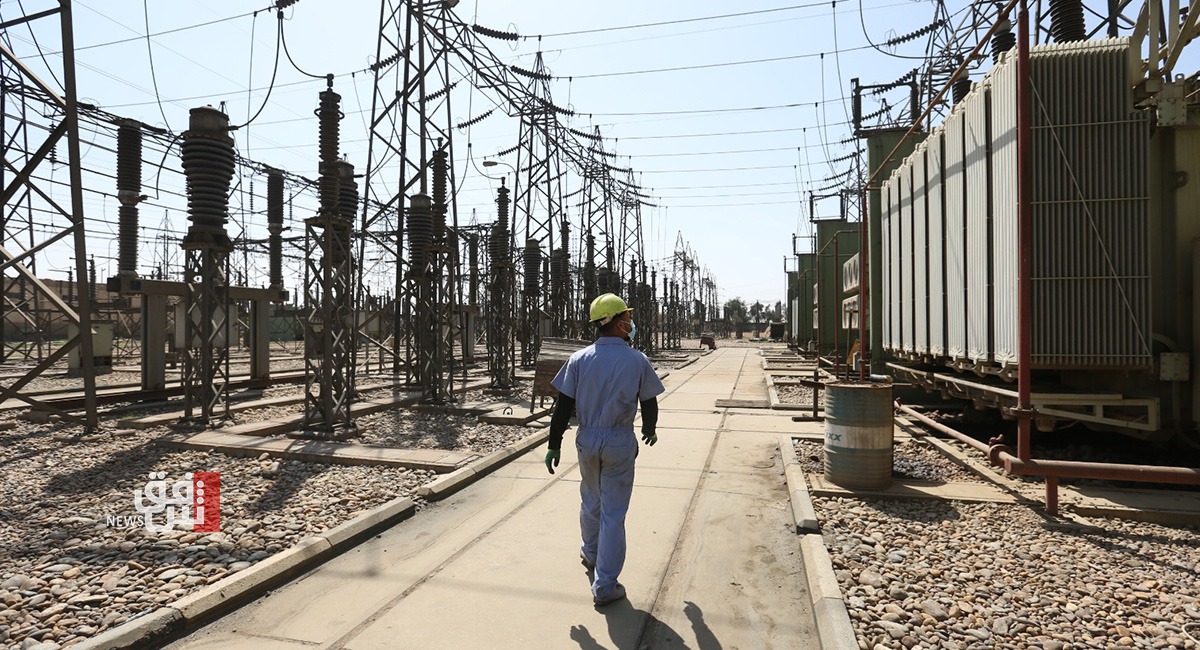"Insurmountable dilemma" fuels Nocturnal Protests: Dissolving the Ministry of Electricity back on the table

Shafaq News / There is still no solution in sight to the insurmountable dilemma of electricity despite disbursing billions of dollars and dozens of ministerial pledges.
Ten ministers were in charge of this ministry, starting with its first minister after 2003, Ayham Al-Samarrai - who ended up in prison and smuggled out of Iraq - and ending with the current minister Majid Hantoush Ali, who is still far from reality despite his recent pledges to improve electricity in the summer.
According to specialists, the bitter reality of the electricity system has proven to be a mission impossible for all governments that have ruled Iraq as they used this file in all elections as an electoral card for pledges that will soon fade with the acquisition of positions.
Gas, High Temperatures, and Terrorism
The Ministry of Electricity justifies its inability to develop the electrical system by the lack of gas, high temperatures, and terrorist operations.
"Iraq has contracts with Iran to supply the Iraqi power plants with 50 million cubic feet of gas. But the Iranian side has reduced gas processing to 5 million cubic feet", ministry spokesman, Ahmed Moussa, told Shafaq News agency.
He added, "The decline in gas processing has harmed the electrical system's production and wasted 5,000-6,000 megawatts, causing, therefore, to a negative impact on power supply hours".
Moussa pointed out, "the high temperatures are also another factor for the lack of supply due to high energy demand, as well as terrorist operations targeting distribution networks and towers every now and then".
Despite the Iraqi Ministry of Electricity's efforts to find solutions to the crisis through linking with the Gulf or Egypt and Jordan, these projects have not yet come into effect, with 80% of the gulf linking project incomplete.
In earlier press statements, the Ministry of Electricity's spokesman attributed the Iranian side's sluggish supply of gas to financial entitlements amounting to 2.6 billion dollars.
Iraq imports 1,200 MW of electricity from Iran via four lines, the Karkha-Amara line, the Abadan-Basra line that supplies the national grid with 300 MW, the Kermanshah-Diyala line that contributes with 400 MW, and the Sarbil Zahab-Khanaqin line with 100 MW.
Corruption and lack of specialized companies
Jassim Al-Bakhati, a member of the parliamentary services committee, said that corruption and the lack of specialized companies were behind Iraq's power crises.
"The absence of a real study of the Iraqi citizens' need, in addition to the fact that the solutions are based on corruption-riddled contracts, are the main causes for Iraq's lack of electricity", Al-Bakhati told Shafaq News agency.
"Every minister who has been in the ministry since 2003 is making promises to improve electricity, but energy is constantly declining. The lack of access to giant electricity companies Such as Siemens and General Electric is the reason why electricity capacity has not been increased nationwide yet", he continued.
He further clarified, "There is a confusion among the state in solving the electricity file, sometimes we import gas, and sometimes we go towards the Gulf connection, but yet there are no tangible results for the citizen".
Lack of strategic planning
Economist Dhurgham Mohammed Ali told Shafaq News agency, "The electricity crisis was caused by the lack of strategic planning in the ministry. The focus has been on the generation sector without coordination with the Ministry of Oil to determine the quality of imported plants to ensure their need for locally available fuel, in addition to the transport and distribution sectors' not keeping up with the expansion of the generation sector, the obsolescence of transport and distribution networks waste 40% of the energy generated as well as significant excesses on the network".
"It is better to dissolve the Ministry of Electricity and refer its projects, financial allocation, its plants, and fuel to be the responsibility of each governorate. The ministry's budget would be allocated for the governorates within the electricity line after the ministry was unable to perform its duties", Ali added.
Half-hearted patchy solutions
"People were not surprised by the near-total lack of electricity because nothing but patchy solutions were found, all of which will be useless as electricity demand increases in the summer", Amir Mohammed Al-Hasani, told Shafaq News agency.
He also added, "The Ministry of Electricity has been the ministry the benefited the most from budget allocations in the past years. Yet, there has been no improvement in the energy level because these funds went to the pockets of the corrupt and were not spent on energy development".
Sajjad Mohammed, another citizen, commented, "All the countries in the world, even the poor ones, do not suffer from energy shortages like Iraq, despite the large financial allocations allocated to the electricity file. There are mafias behind preventing energy improvement in Iraq".
"Electricity is the backbone of the economy, and therefore its shortage means the cessation of life and the productive process in the country", he added.
Night demonstrations
Several governorates in central and southern Iraq often witness protests over power outages, sometimes leading to clashes with security forces.
Dozens of residents of the Al-Wihda neighborhood, southeast of Baghdad, staged a demonstration last Friday calling for better services and electricity, but security forces quickly intervened to break out clashes between the two sides. According to Shafaq News agency's reporter, "Angry protesters in the Al-Wihda neighborhood set fire to tires and blocked roads to protest the power shortage".
Iraq has been suffering from a shortage of electricity supplies since 1990 following a UN blockade of Iraq. The problem exacerbated after 2003, with power outages increasing to about 20 hours per day, increasing people's reliance on small power generators.
Most Iraqi governorates are witnessing an increase in electricity shortage with the beginning of Ramadan. Citizens resorted to domestic generators to make up for the shortage while wondering about the ministry's ability to meet the people's needs as summer approaches and temperatures rise dramatically.





